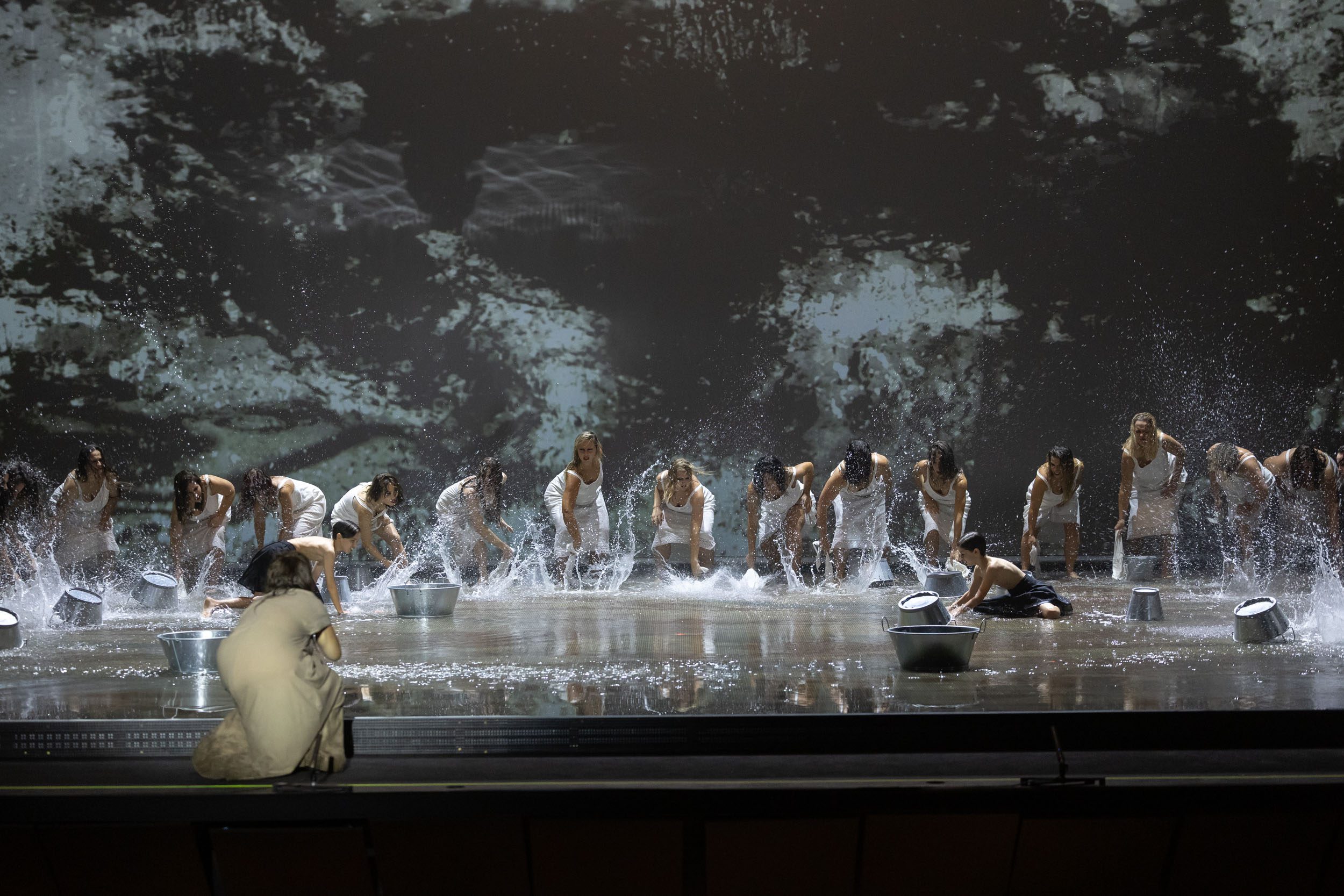
Yerma
Synopsis
Ópera de Tenerife opens its 2025-2026 season with its own production of Yerma, by Brazilian composer Heitor Villa-Lobos, based on the play of the same name by Federico García Lorca. This opera, composed in 1956, was not premiered until 1971 at the Santa Fe Opera in New Mexico, 12 years after Villa-Lobos’ death. At that time, the role of Yerma was brought to life by soprano Mirna Lacambra, a leading figure in opera who will be with us on the day of the premiere.
Ópera de Tenerife is reviving this masterpiece in an international co-production, which marks the European premiere of Yerma and a new critical edition of the score, making it a complete revival.
Paco Azorín is in charge of stage direction and set design for this international co-production between the Tenerife Auditorium, Teatro de la Zarzuela, Amazonas Opera Festival (Manaus, Brazil), and Opera Festival of Theatro da Paz (Belém, Brazil).
Artistic datasheet
Musical Direction: Luiz Fernando Malheiro (days 14, 16 y 18) and Pablo Urbina (day 17)
Stage management and scenography design: Paco Azorín
Choir conductor: Miguel Ángel Arqued
Script and stage choreography: Carlos Martos de la Vega
Video design: Pedro Chamizo
Costume design: Ana Garay
Lighting design: Pedro Yagüe
Stage Director’s Assistant: Riccardo Benfatto
Historical-psychological advice: Blanca Torres
Répétiteurs: Hana Lee, Elizabete Sirante
Lighting Operator: Aridian González Bassou
Stage Management: Luis López Tejedor
Production of Auditorio de Tenerife, Zarzuela Theatre, Festival Amazonas de Ópera (Manaos, Brazil) and Festival de Ópera do Theatro da Paz (de Belém, Brasil)
YERMA pour Heitor Villa-Lobos
New critical edition, revised by Luiz Fernando Malheiro
Libretto based on the eponymous tragedy by Federico García Lorca.
Durand S.A. (Max Eschig catalogue), Paris (France)
Publishers and Rights Holders
Cast
Yerma: Berna Perles (days 14, 16 y 18) and María Miró (day 17), sopranos
Juan: Alejandro Roy, tenor
Víctor: Javier Castañeda, baritone
María: Anna Gomà, mezzo-soprano
Dolores: María José Montiel, mezzo-soprano
Old woman 1: Belén Elvira, mezzo-soprano
Old woman 2, laundress 4: Guadalupe Barrientos, mezzo-soprano
Old woman 3, girl 1, laundress 5: Zayra Ruiz, soprano
Old woman 5, girl 2, sister-in-law1, laundress 3: Alexandra Urquiola, mezzo-soprano
Woman 2, laundress 2, sister-in-law 2: Marga Cloquell, soprano
Woman 1, laundress 1: Carmen Mateo, soprano
Macho (male): Alberto Ballesta, tenor
COMPRIMARIOS
Child: Laura Kmetic, soprano
Old woman 4, laundress 6: Laura Pérez, soprano
Old woman 6: Alicia Jerez, mezzo-soprano
Woman 1, woman 2: Andrea Gens, mezzo-soprano
Man 1: José Sebastián Pulido, tenor
Man 2: Andrés Darío Rodríguez, bass
Actresses and actors: Elen Santana, Ylenia de Luis, Ezequiel Tagliapietra and Salvador Rodríguez
Child Performers: Álvaro Rodríguez, Daniel Rodríguez, Pedro Clemente and Álvaro Clemente (days 14 and 17) and Luca Fuentes, Aarón Jiménez, Eloy Jiménez and Leo Rodríguez (days 16 y 18)
Gallery
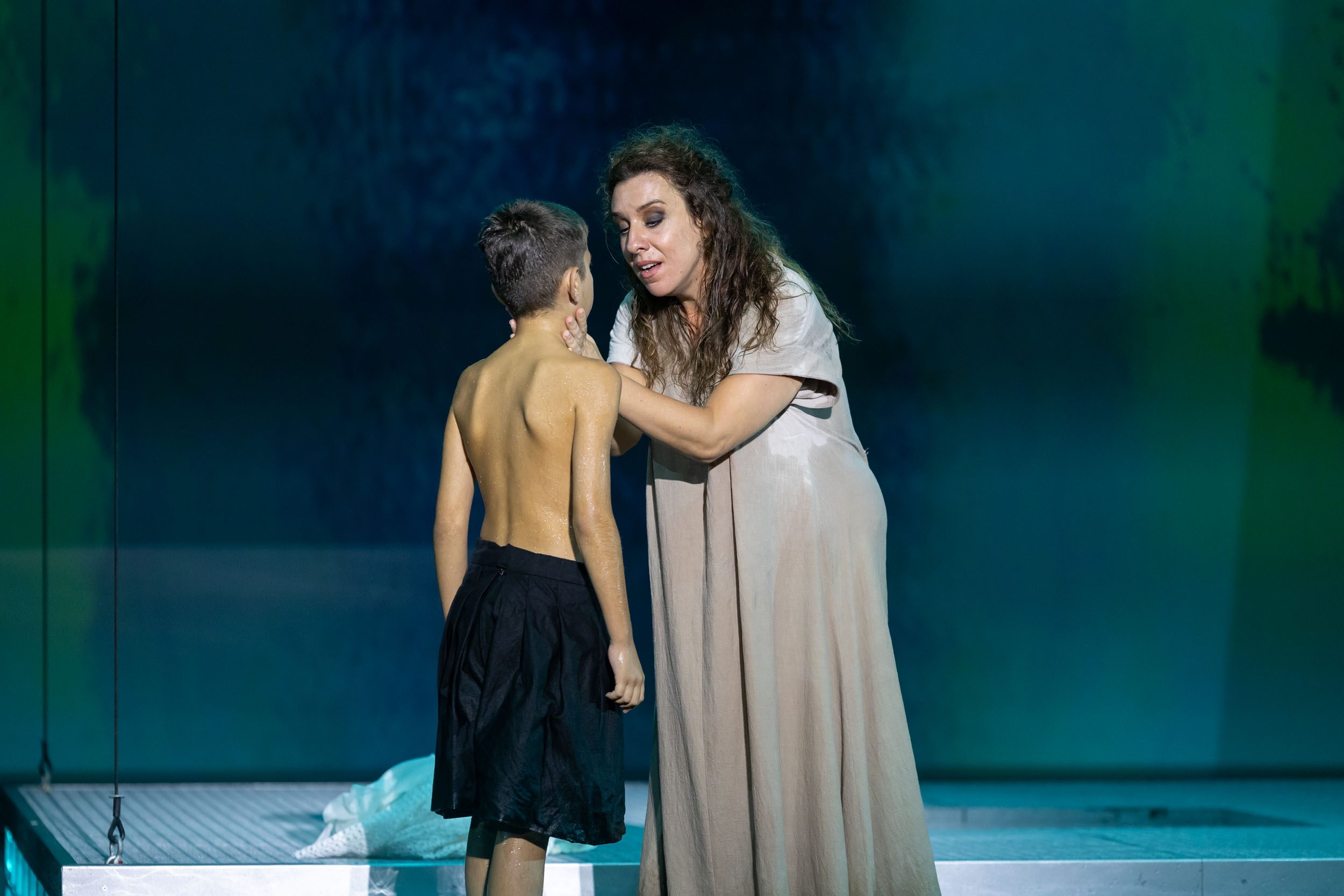
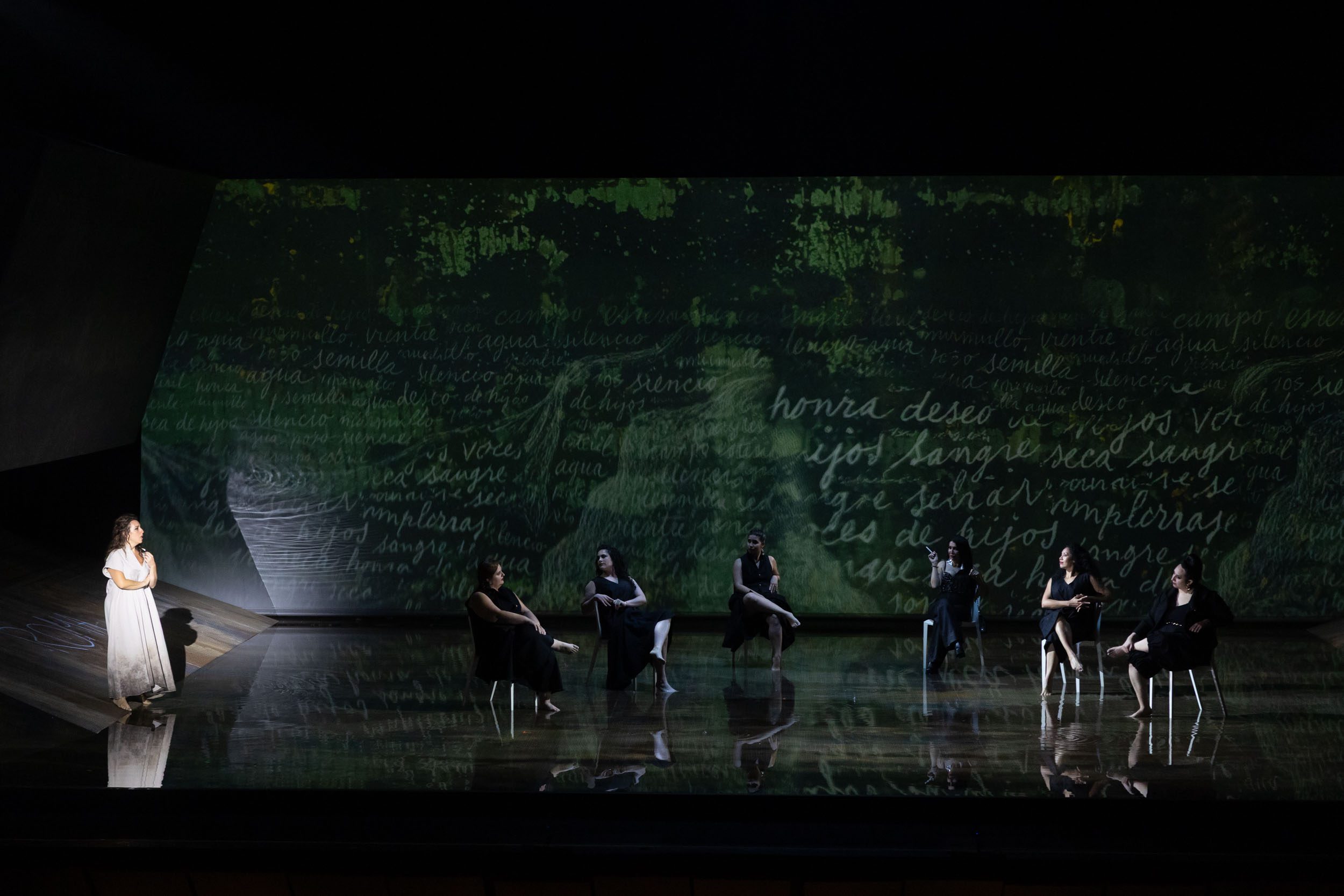
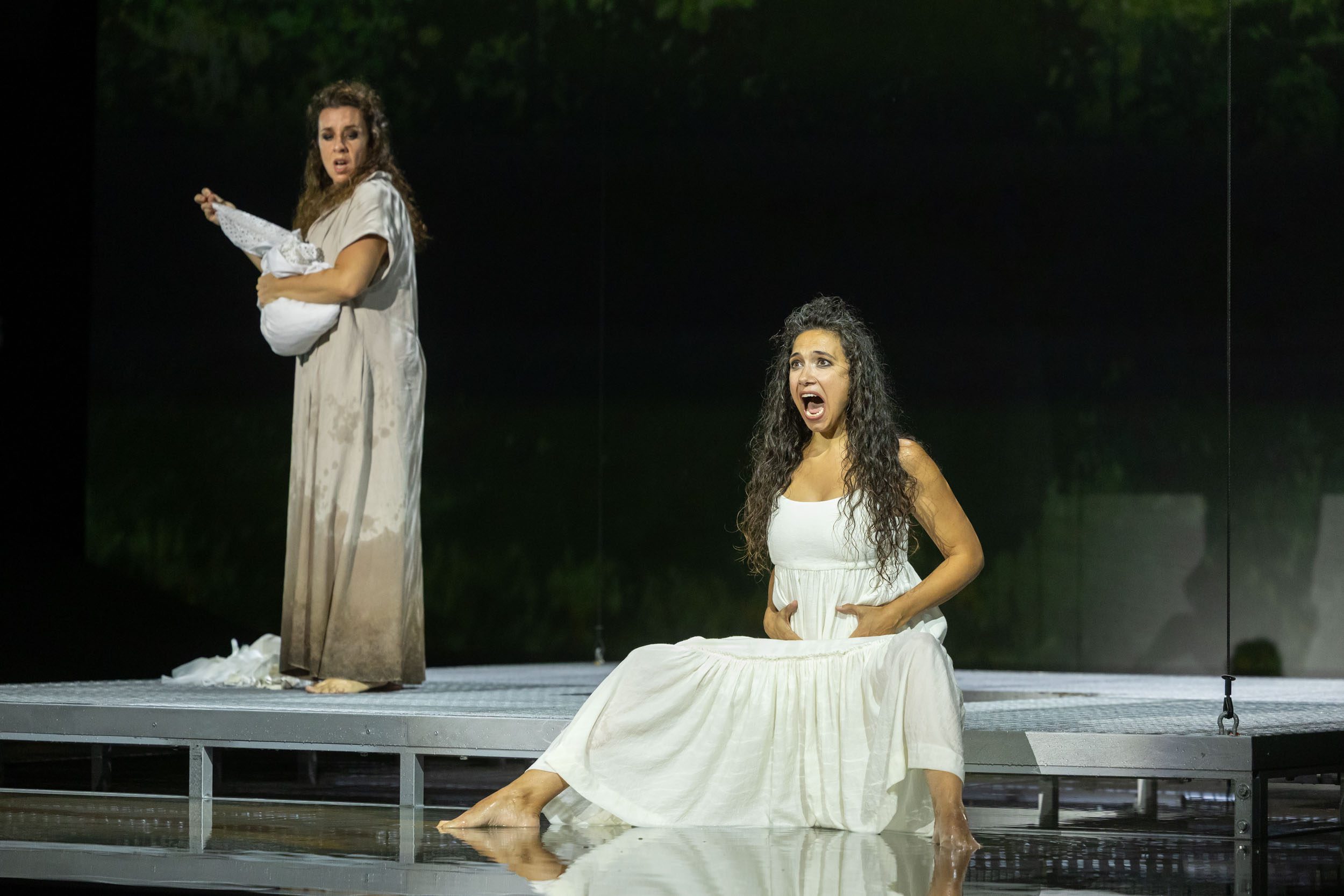
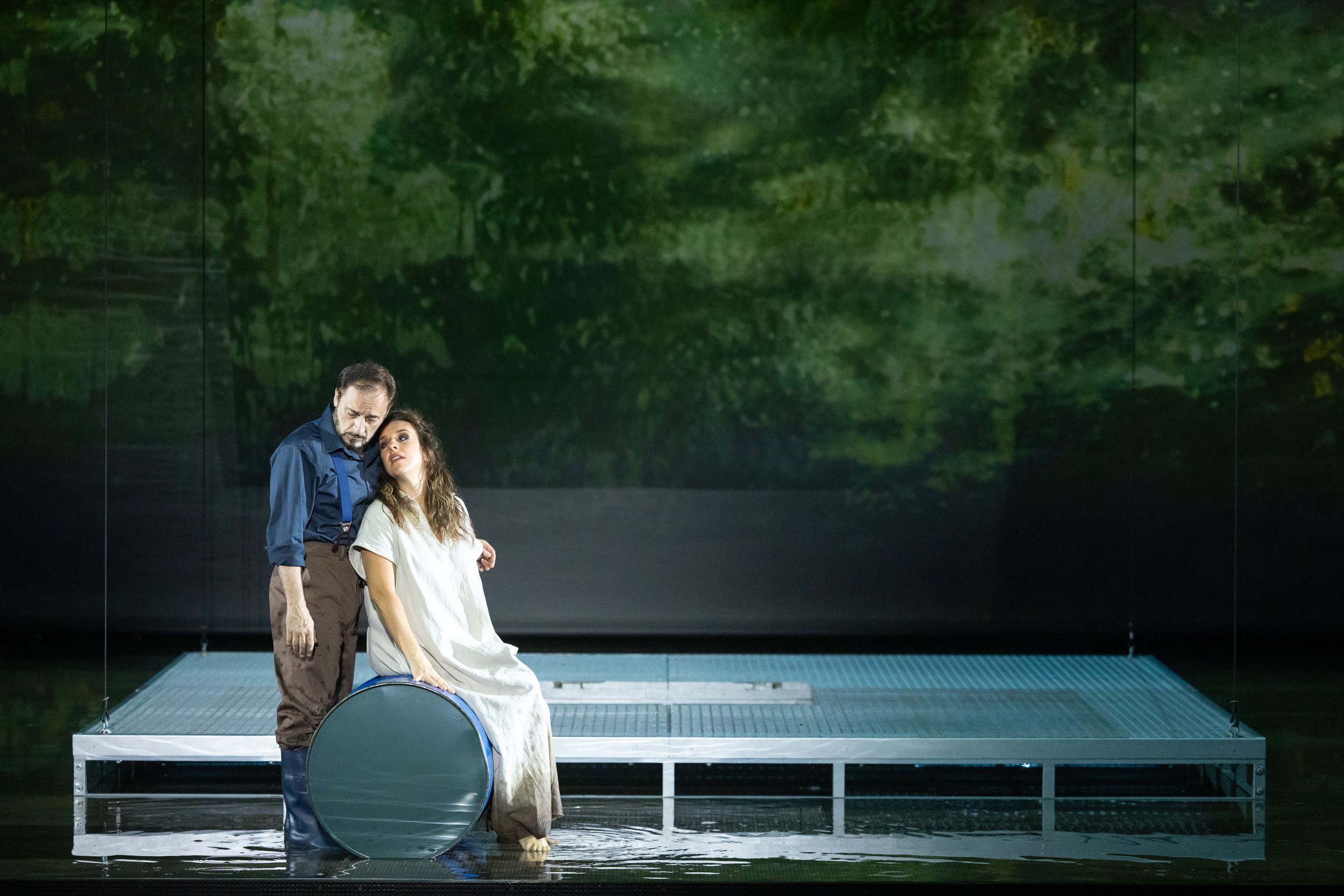

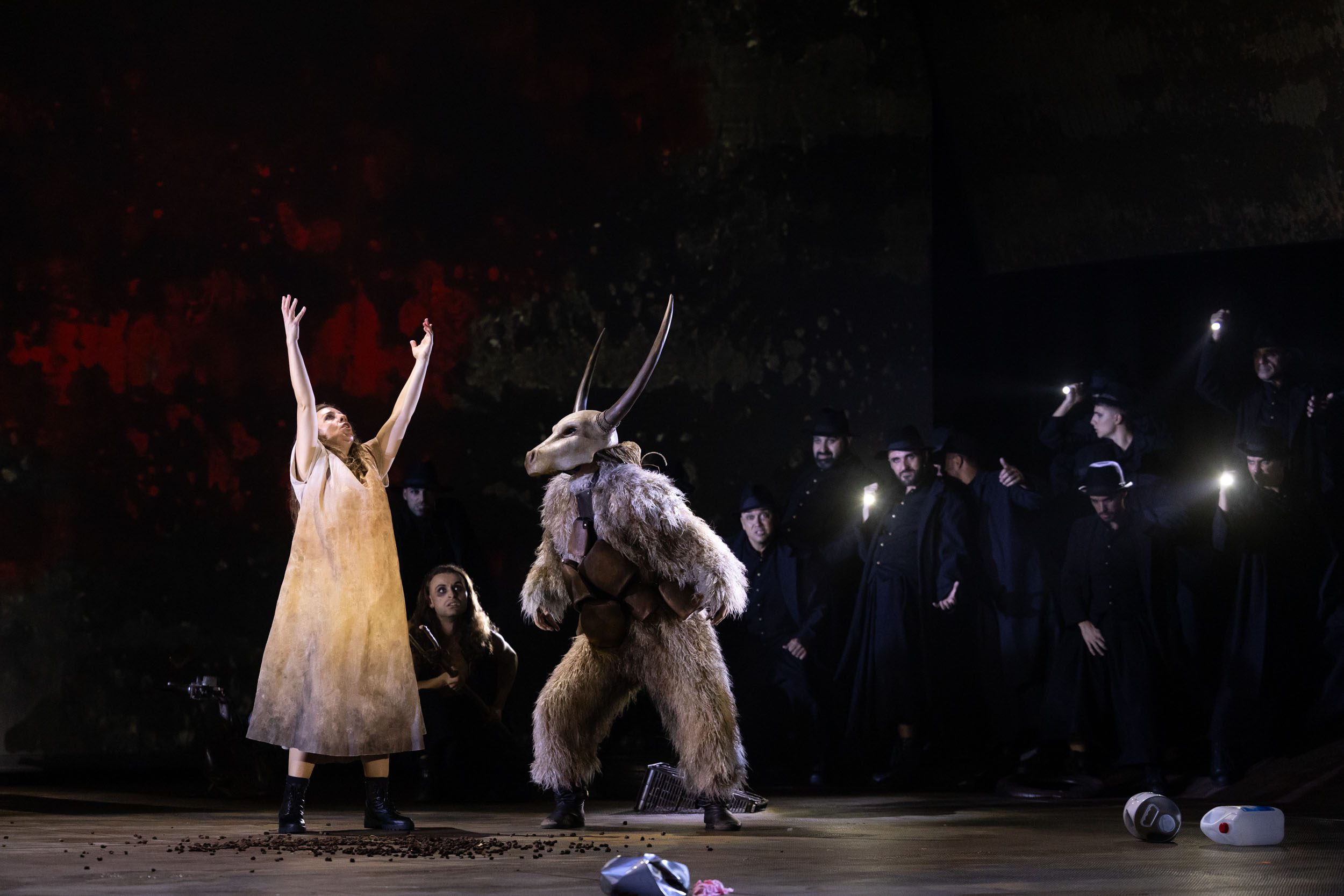
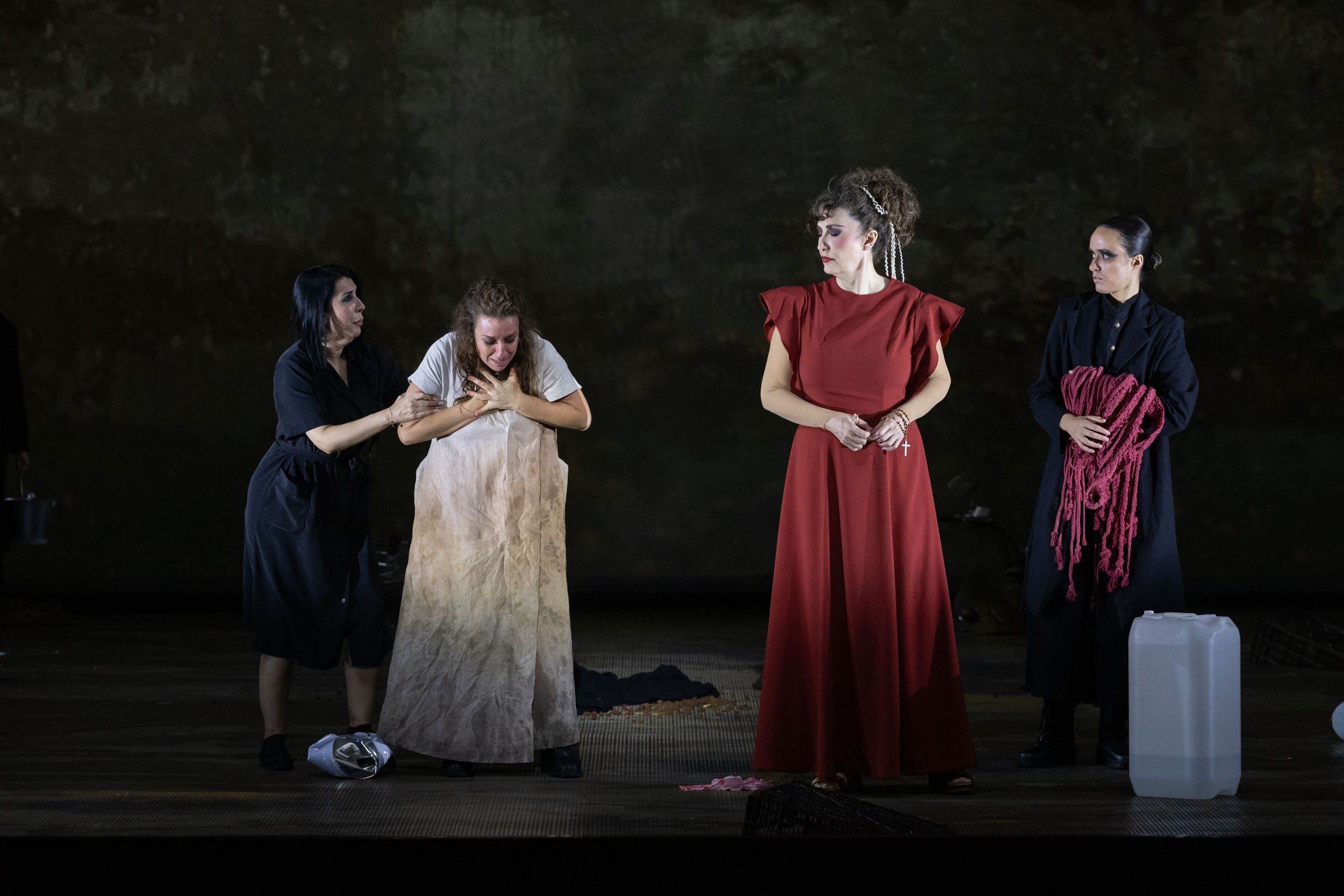
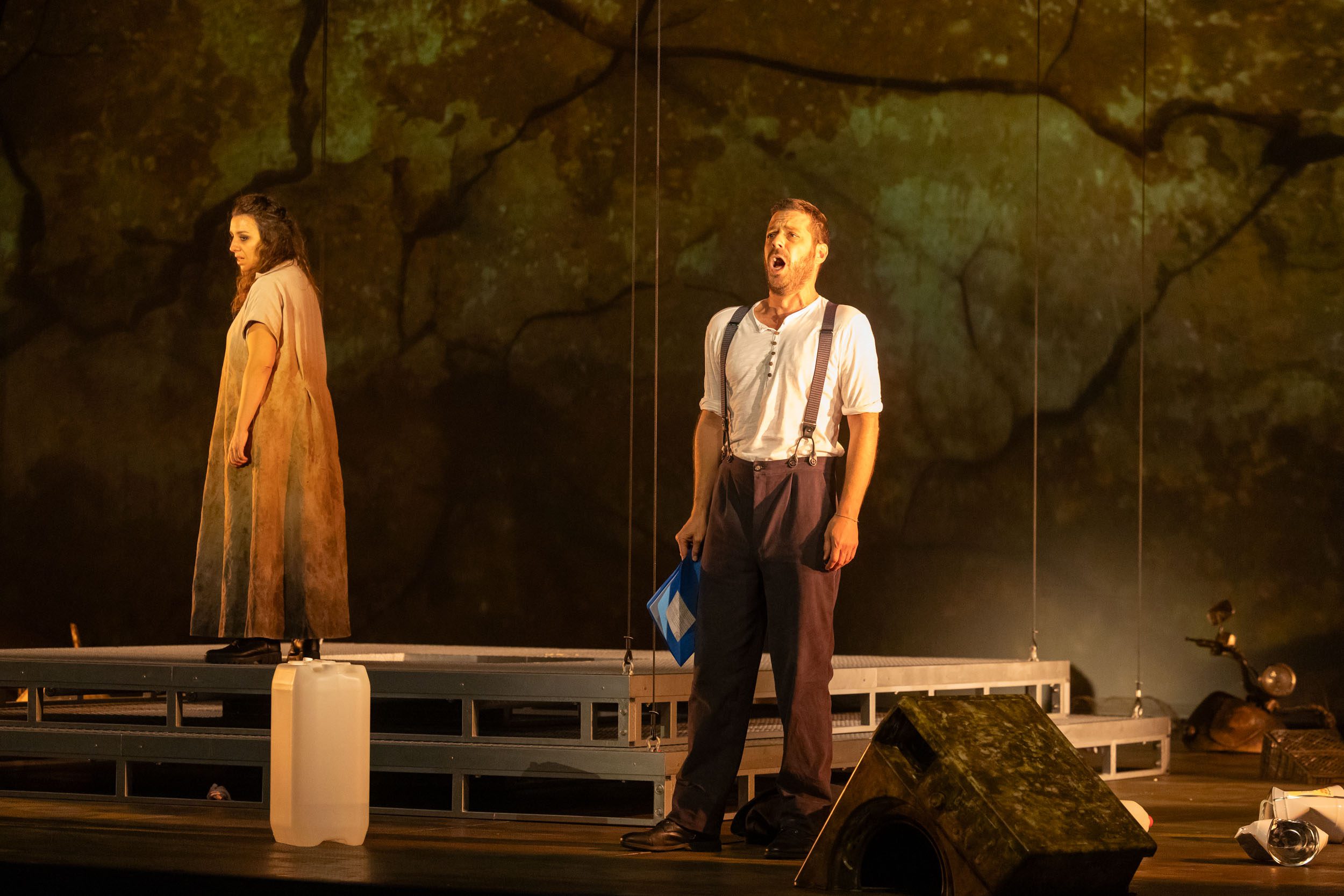
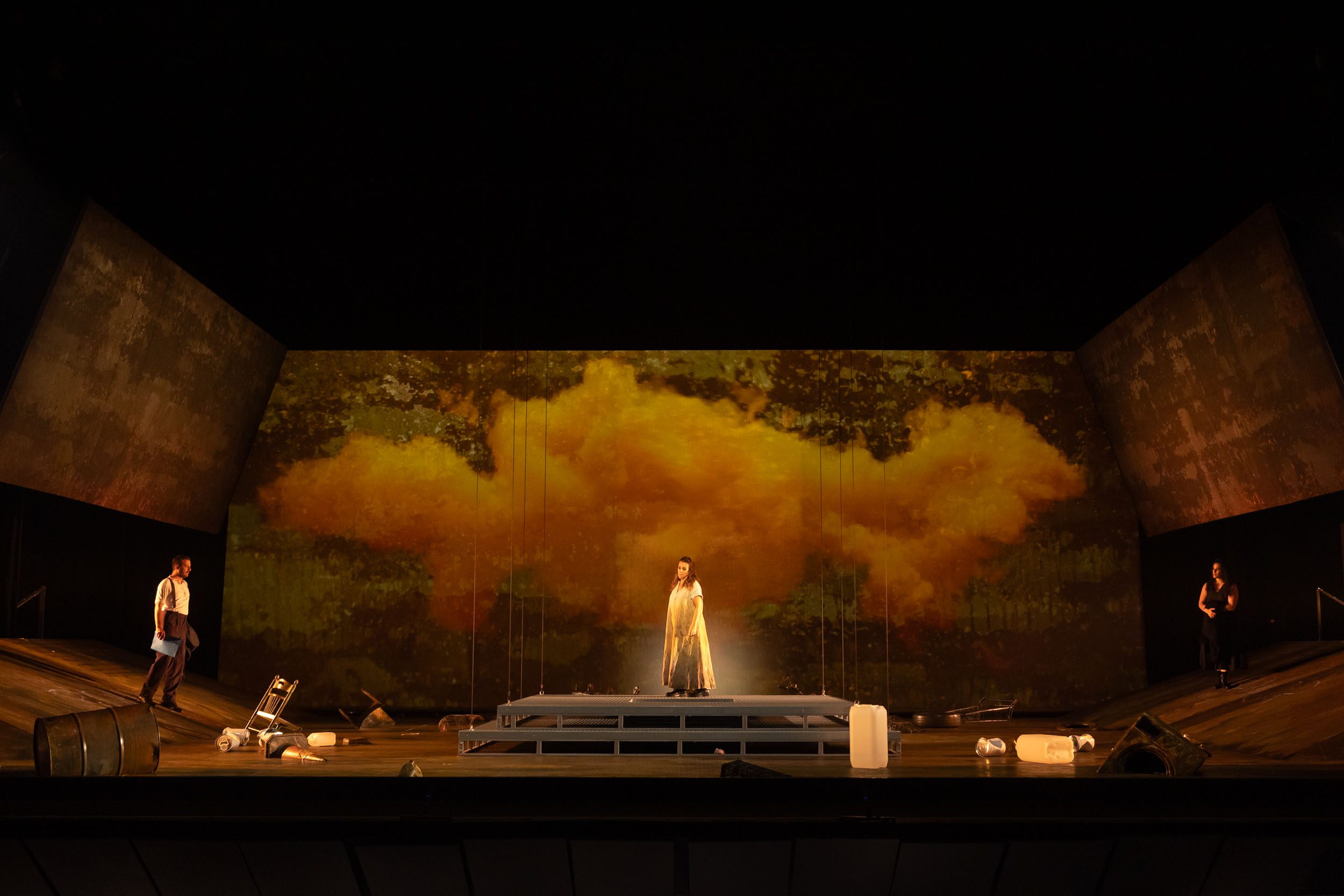
Multimedia
Yerma: an opera about the land
There is no force on Earth as powerful as desire.
I want to be a flood of water that carries away the stones.
— García Lorca
Although Federico García Lorca is well known for his vivid imagination, it is hard to believe that the Granada-born poet could have imagined the calamitous state into which our planet has fallen less than a century after his unjust death. In Yerma, Lorca speaks to us of the fertile and the barren, of desire turned to obsession, of the Earth and the body as symbolic spaces of life or emptiness. The name of its protagonist is no coincidence: Yerma (Barren) is more than a character. She represents a condition and a warning, a metaphor for the consequences of physical, spiritual or ecological fertility running its course.
Of the poet’s three rural tragedies, Yerma is particularly caustic, as the title character is doomed by forces beyond her grasp: duty, loveless marriage, the prying eyes of villagers and, in particular, the fear of gossip that crushes a woman’s resolve like the heaviest of stones. Yerma not only desperately wants to have a child, but she also longs for a fullness of life that the patriarchal society will not allow her. Her wishes are repressed and deformed by social mores, and she is driven to madness in a tragic and liberating final act. Similarly, our planet cries out for offspring and regeneration, but our ambition blinds us, and we leave her barren.
With this production, we wish to pay tribute to our Earth, to the Blue Planet and its environmental diversity and wealth, so that we humans may remain fertile. The figure of Yerma embodies desperation that is born of abandonment, silence and isolation and comes to symbolise a planet that voicelessly cries out for its right to life.
We propose for you a journey in which electrifying images abound: images that need not words but silence; images that strike your retina and reveal that the Earth’s drifting course is no accident but the result of unbridled capitalism that rots, depletes and devours all that it touches. Just as Yerma lives her life under the asphyxiating pressure of duty, our civilisation remains the prey of a predatory model that will not allow natural balance.
We invite you to take part in this lyrical-sensorial experience that obliges us to contemplate our human and planetary behaviour. As Lorca showed us, water is a symbol of life. We must not allow life to wither, desire to shrivel or our Earth (like Yerma) to run dry. It’s not too late.
Paco Azorín
Free round-trip transport
For subscription opera performances, free round-trip transport is provided by two TITSA buses departing from the south and north of he island. For more information, routes and tickets, click here.
Tickets for the performance on Tuesday the 14th
Tickets for the performance on Thursday 16th
Villa-Lobos
Born in Rio de Janeiro on March 5, 1887, the composer Heitor Villa-Lobos passed away in the same city on November 17, 1959. He was the son of Raúl, a librarian and amateur musician, and Noêmia, a housewife of indigenous heritage. His father provided his initial musical training. Throughout his childhood, Villa-Lobos’ home was open to many musicians, with his family gaining recognition for their musical evenings. By the time his father died when he was 12, Villa-Lobos had already embarked on a professional music career, despite family hopes that he would study medicine. He acted as a café musician on the cello, the instrument his father played, and also occasionally performed on guitar, clarinet, and piano.
At the age of 18, in 1905, he undertook his first trip—an intensive exploration of Brazil’s north-eastern states—which enabled him to collect valuable information about the folk music of those areas. His stories about this expedition endowed it with an air of mystery and fantasy, highlighting its importance as a highly productive and formative musical experience. Following this voyage, he registered at the National Institute of Music in his hometown, but never fully embraced formal academic traditions. His interest in ethnomusicology led him to continue travelling, including a trek through the Amazon basin. He returned to Rio in 1912, and three years later presented a concert featuring his own compositions—new music that already displayed the hallmarks of his style, impossible to categorise, free from the conventions of academic nationalism, with a signature he described as ‘natural music’, inspired by indigenous, African, and Portuguese cultures. Reception of his music in Brazil was mixed: while the more conservative audience did not understand his approach, others were enthusiastic.
In 1923, he secured a government grant to study in Paris. A decade prior, he had married pianist and composer Lucília Guimarães. Paris, the cultural hub of Europe at the time, warmly received his music. The colourful nature of his compositions, unlike anything known in Europe, was much admired. While there, he encountered notable musicians such as Stravinsky, Ravel, and Varèse, whose works left a lasting impact on his music.
Returning from Paris in 1930, he was appointed Director of Music Education in his hometown. This position enabled him to embark on a distinct path in his career, that of a pedagogue. Together with Lucília Guimarães, who remained his wife until 1936, he created and launched a comprehensive system of music instruction for public schools throughout Brazil, one deeply grounded in popular culture and steeped in clear and heartfelt patriotism.
Starting to compose at 14, Villa-Lobos created almost two thousand works, including many reworkings of originals. His best-known pieces were composed between 1932 and 1938, especially the six Bachianas brasileiras, which aimed to blend Bach’s contrapuntal style with Brazilian folk melodies. These include works for eight cellos (1932), chamber orchestra (1933), piano and orchestra (1934), solo piano (1930–1940; orchestration completed in 1942), voice and eight cellos (1938), and flute and bassoon (1938). His guitar repertoire features Preludes, Studies, and various Chôros—fifteen pieces composed from 1920 to 1928 for different instrumental settings—that exemplify the fusion of popular and classical traditions.
Among his dramatic works, his four operas stand out: Izaht (1914), Magdalena (1948), Yerma (1955), and The Cloud Maiden (1957), alongside central themes for the films Descobrimento do Brasil (1938) and Green Mansions (1959). His extensive output also includes the symphonic poem “Amazonas” (1917), the ballet-poem “Uirapuru” (1917), “Rudepoema” for piano (1926), “Emperador Jones” (1955), and Symphony No. 12 (1958). He wrote his first five symphonies between 1916 and 1920; he returned to this form in 1944 and composed until his last symphony in 1958.
His most inspiring and productive partnerships with other musicians include his friendship and collaboration with Uruguayan guitarist Abel Carlevaro, whom he met in 1940 in Montevideo, and Brazilian soprano Bidu Sayão, with whom he formed an artistic relationship that lasted 38 years. Villa-Lobos brought Carlevaro to Rio to show him his guitar scores, teach him to perform them, and gifted him manuscripts of some of his compositions. He shared his compositional philosophy and explored Brazil’s profound musical traditions with him. The young guitarist went on to premiere some of Villa-Lobos’s pieces.
The 1940s marked his rise to international fame, with numerous commissions coming from the US, some of which were connected to Hollywood. His music was also enthusiastically embraced in Los Angeles, New York, and Paris.
Heitor Villa-Lobos is recognised as one of Latin America’s foremost composers and a pivotal figure in Brazilian music during the 20th century. His work has left an enduring mark on Latin American music, performed by orchestras worldwide and continues to be studied and appreciated today for its artistic value and its contribution to the construction of Brazilian cultural identity.
Story
Scene I
While asleep, Yerma hears the voice of her unborn child. Upon waking, she calls her husband, Juan. When he heads out to the fields, she reminds him of their two-year childless marriage. Coldly, Juan advises her to be patient, warning her to avoid gossip by staying at home. Once alone, Yerma dreams of her child again. María arrives, joyfully but fearfully confessing her pregnancy. Yerma comforts her with words: 'To have children is good, healthy, and beautiful... without them, a woman turns to poison.' Before leaving, María asks Yerma to make clothes for her baby, and Yerma happily agrees. Víctor arrives asking for Juan. Believing Yerma is making clothes for her own child, he congratulates her. Learning it is for María, he remarks that Juan should worry less about work and urges Yerma to persist more earnestly. Alone once more, Yerma yearns: 'When, child, when will you come to me?'
Scene II
One year later, Yerma returns dutifully to her home after delivering food to her husband, who is working in the fields. On the way, she encounters other women and asks for their advice. She is still childless. An older woman with fourteen children comments, 'They came like water... You take a step, and at the street's end, a horse neighs.' The women ask Yerma if her husband pleases her, if she trembles when he is near. Yerma says no; she only felt such emotions while dancing with Víctor and when, as a girl, he lifted her over a ditch, but her husband is another matter: 'My father gave him to me, and I accepted him.' The women smile and say, 'But men must give us pleasure, that's how the world works.' Yerma replies, 'Your world, not mine... I shall give myself to my husband to have a child, never merely for pleasure. ֺ' Impatiently, the women leave, protesting that although they would never risk their honour, Yerma should be less naive.
Two young women arrive. One leaves her baby unattended, prompting Yerma to reprimand her, worried for the child's safety, urging her to rush home. The other girl expresses relief at having no children, wanting to stay her husband's sweetheart and feel free to have affairs outside the home. She wonders why everyone is stuck inside their homes doing things they dislike, and says that she did the same with her boyfriend as she does now, while older people have different ideas about marriage. Her mother continues to prepare herbs to help her conceive a child and plans to take her on a pilgrimage to the hermitage where it is said a saint grants children to those who pray. The girl has no intention of praying to the saint; her mother will do that.
Yerma is very curious about the young woman's mother, who is called Dolores. Left alone, she hears Víctor, the shepherd, singing as he comes in. She remarks on the energy and joy of his song. Both feel a strong mutual attraction. Yerma hears a child's voice. Upon Juan's arrival, the tension between him and Víctor is evident, and Víctor leaves. Juan again warns Yerma to avoid rumours by not talking in the streets and orders her home, saying he has to work through the night in the fields. 'Go to bed and rest,' Juan instructs. Yerma retires to bed.
ACT II
Scene I
A group of women is washing clothes in a mountain stream, chatting about Juan, who has placed his two sisters with Yerma to watch over her. They speculate whether Yerma has a lover. The arrival of Juan's sisters prompts the women to switch topics and sing songs celebrating the sensual delights of marriage.
Scene II
Juan reprimands his sister at home for letting Yerma leave the house alone. Yerma enters with water from the well. It has been five years, and they remain childless. Juan advises Yerma to bring a young brother to live with them to look after. She refuses, unwilling to care for another's children. Desperately, Juan begs her to resign herself for the sake of peace in their lives. Most importantly, she must stay at home to avoid gossip and to uphold the family's honour. Juan then goes to dine alone with his sisters.
While singing to her unborn child, Yerma sees María with her baby and asks to hold it. She returns the child immediately, feeling unfit: 'I feel two hammer blows in my chest instead of a child's mouth... I am part of a barren land, forsaken by God's hand... My footsteps echo like those of a man... I am starting to believe I am my own child.' Yerma is aware of rumours about her liking another man but remains firm that 'honour is paramount for a woman of my standing.' She cries as María walks away. Dolores, María's mother, seeks to find Yerma.
Víctor arrives and tells Yerma he is leaving; shortly afterwards, Juan appears and lets Yerma know he has bought Víctor's flock of sheep. Before both men go, Yerma and Víctor share a silent but deeply felt moment. Yerma pauses in anguish and quickly goes to visit Dolores. Juan's sisters discover he has gone.
ACT III
Scene I
Dolores tells Yerma the prayers and charms she must perform to conceive a child. Yerma longs to have the child by herself, as she does not love Juan. Noise is heard: Juan and his sisters approach. Juan accuses Yerma of dishonouring him. Yerma insists on her innocence, but Juan scolds her, lamenting that, for the sake of the family's honour, he must bear his wife's betrayal in silence. He complains that his work in the fields prevents him from avoiding Yerma's deceit and that she has mistreated him since their wedding. Yerma, desperate, implores and calls for her husband's love, asking him not to push her away. Juan leaves while Yerma falls to the ground, cursing her father for passing on 'the blood of a hundred children' to her. She curses herself for chasing after them, and reveals her anguish: ‘To wish with the mind is one thing, with the body another. My destiny is sealed.’ Yerma departs crying, wishing her mouth could be silenced forever.
Scene II
At a mountain hermitage, people cynically discuss women without children who will come to pray for fertility, as young, affectionate men participate in the pilgrimage. Yerma participates in the women's procession and enters the chapel to pray. Outside, a male and a female mask perform a pagan dance, singing about the pleasures of sensual love. Yerma comes back from the hermitage. An old woman claims Juan's sterility is to blame for Yerma's condition; she advises Yerma that to have a child, she must seek out another man to conceive, and invites Yerma to meet her son, a man of great vitality. Yerma responds with outrage, declaring that such an act would betray her sacred honour. The old woman leaves, telling Yerma she is doomed to perpetual barrenness. Juan arrives.
Having heard the two women talk, he realises Yerma has been faithful. His honour is assured. He fervently states that he is pleased they have no children. She should never wait for anyone. He wants Yerma exclusively for himself. As Juan reaches to embrace her, Yerma perceives that her husband merely desires her to satisfy his sexual appetite: 'You love me as you sometimes love to eat a pigeon'. Grasping him blindly, she strangles him, crying to the women surrounding her: 'Barren, barren, and alone... my body forever dry... Please stay away from me, for I have killed my child... I have killed my own child.’
Program handout
Tickets
This opera is sung in Spanish with surtitles in Spanish and English.
Access to the hall is not permitted once the doors are closed for the event's start.
Access is only allowed to those over five years of age.
For further information, please check the general purchase terms and hall conditions.
If you have any questions while purchasing your tickets, please write to taquilla@auditoriodetenerife.com or call 922 568 625 from Monday to Friday from 10 a.m. to 2 p.m., except for public holidays.
You might be interested
The work by the Brazilian composer Villa-Lobos, featuring Lorca’s complete libretto, debuts on the island with a stage designed as a swimming pool Tenerife will see the European premiere of Yerma, an opera by the composer Heitor Villa-Lobos, based on the eponymous work by Federico García Lorca. The performances will take place on October 14, […]
An eco-conscious adaptation, the work is to be performed on 14, 16, 17 and 18 October The Auditorio de Tenerife presents the European premiere of Yerma, an opera by composer Heitor Villa-Lobos based on the eponymous work by Federico García Lorca. The performances take place on October 14, 16, 17, and 18 in the Symphony […]
The music disseminator will focus his Tuesday talk in the Chamber Hall on the opera based on Lorca’s play The music communicator Ramón Gener will be back at the Auditorio de Tenerife next Tuesday (September 30) at 7.30 p.m. in the Chamber Hall to present the European premiere of Yerma. Gener’s opening talk of the […]